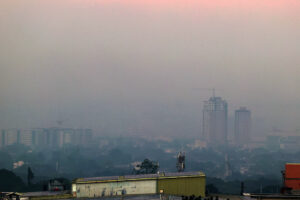




Inflation Update: Green light for easing
 DOWNLOAD
DOWNLOAD

December Economic Update: One for them, one for us
 DOWNLOAD
DOWNLOAD

Philippines Trade Update: Trade trajectories trend along
 DOWNLOAD
DOWNLOAD


DoF studies carbon tax, emissions trading system

The Department of Finance (DoF) is studying the establishment of a “responsive and economically sensitive” system of carbon pricing for the country, its top official said.
“The development of carbon pricing instruments through a carbon tax and emissions trading system (ETS) is one of the crucial steps we are undertaking towards a greener future,” Finance Secretary Ralph G. Recto was quoted as saying in a speech.
“Carbon pricing instruments serve as a powerful fiscal tool, allowing us to incorporate the social and external costs associated with carbon emissions,” he added.
The DoF held a technical working group meeting on Tuesday to discuss the development of carbon pricing instruments. Among the attendees were representatives from the World Bank, the Economic Consulting Associates, the Asian Development Bank, and the United Nations Development Programme (UNDP).
The Finance department under then-Secretary Benjamin E. Diokno earlier said it was studying a carbon pricing system to encourage businesses to shift to sustainable practices. Former Finance Secretary Carlos G. Dominguez III had also proposed a carbon tax under the outgoing administration’s fiscal consolidation plan, which was initially expected to be implemented in 2025.
A carbon pricing scheme encourages companies to reduce their own emissions in order to minimize their tax exposure. Proceeds typically go towards supporting greenhouse gas mitigation projects.
The Philippines currently does not have any explicit form of carbon pricing.
“Despite our miniscule contribution to global carbon emissions at 0.48%, the Philippines bears the brunt of the worsening effects of global warming,” Mr. Recto said.
The Philippines is targeting to reduce greenhouse gas emissions by 75% by 2030.
Mr. Recto said the system aims to push businesses and individuals to reduce their carbon footprint and ultimately contribute to a low-carbon economy.
“All these while helping us mobilize financial resources to bolster our fiscal space for stronger economic recovery,” he added.
The Finance chief also noted that it will be crucial to identify an “optimal combination” of pricing instruments that is mutually beneficial to all stakeholders.
“We must extend our focus beyond mere transformations within industrial sectors. Emphasizing research and development for low-carbon technologies and incentivizing behavioral change is equally crucial,” Mr. Recto said.
A study by the International Monetary Fund (IMF) last year showed that the Philippines could generate up to USD 7 billion in revenues through a carbon pricing scheme.
Implementing a carbon price of USD 50 per ton by 2030 could reduce carbon dioxide emissions to 144 million tons or 13% below baseline levels, it added.
“The work should also not just focus on ambition, it should assess the fiscal impact — how different sectors will be affected, how jobs will be affected — so that the policy makers around here can see the different dimensions of the problem and can adopt a policy that is environmentally sustainable, socially just, and economically sound,” World Bank Country Director for the Philippines Ndiame Diop was quoted saying.
The Department of Environment and Natural Resources (DENR) is also working with ADB and UNDP to explore carbon markets and carbon trading.
Meanwhile, the Climate Reality Project Philippines manager Nazrin Camille D. Castro said that the Finance department’s study on carbon pricing is a welcome development, however, it must be approached with “utmost caution,” especially for tools such as ETS.
“The Philippines, at the moment, faces limitations in institutional capacity, regulatory infrastructure, and data management. If left unaddressed, these can cripple any form of ETS, making it more of a burden than a solution,” she said in a Viber message.
“Any future ETS must be meticulously designed and shielded by robust safeguards. Stringent caps, aligned with the Philippine Nationally Determined Contribution, are crucial to ensure genuine climate progress,” she added.
Ms. Castro said there is a need for good governance and strict regulations to “prevent market manipulation and leakages that will allow polluters to simply shift their emissions to unregulated sectors or regions, negating the overall reductions.”
“Equity must also be a cornerstone of our approach. ETS can disproportionately harm low-income communities through cost pass-through, job losses, and worsened pollution if permit allocation and trading mechanisms are not designed fairly,” she said.
“ETS should be designed with a transparent allocation process, revenue redistribution for clean energy projects in affected areas, and auctions designed to favor smaller companies,” she added.
Ms. Castro said the DoF must also ensure that the ETS prioritizes direct emission cuts as companies should not be encouraged to rely on offsets.
“Offsets, while tempting, are a slippery slope. Their unreliability casts doubt on actual emissions reductions at source… A sustainable future cannot be built on isolated strategies. It demands a holistic approach. Carbon pricing and ETS are pieces of a broader puzzle. We implore the DoF to pursue them alongside essential measures like renewable energy investments, energy efficiency promotion, and ecosystem protection,” she added.
This article originally appeared on bworldonline.com





 By BusinessWorld
By BusinessWorld